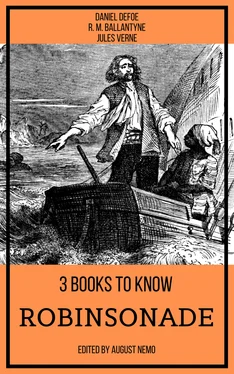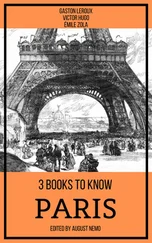“I wish we had a breeze,” said Jack.
“So do I,” cried Peterkin, resting on his oar and wiping his heated brow; “pulling is hard work. Oh dear, if we could only catch a hundred or two of these gulls, tie them to the boat with long strings, and make them fly as we want them, how capital it would be!”
“Or bore a hole through a shark’s tail and reeve a rope through it, eh?” remarked Jack. “But, I say, it seems that my wish is going to be granted, for here comes a breeze. Ship your oar, Peterkin. — Up with the mast, Ralph; I’ll see to the sail. Mind your helm; look out for squalls!”
This last speech was caused by the sudden appearance of a dark-blue line on the horizon, which, in an incredibly short space of time, swept down on us, lashing up the sea in white foam as it went. We presented the stern of the boat to its first violence, and in a few seconds it moderated into a steady breeze, to which we spread our sail and flew merrily over the waves. Although the breeze died away soon afterwards, it had been so stiff while it lasted that we were carried over the greater part of our way before it fell calm again; so that when the flapping of the sail against the mast told us that it was time to resume the oars, we were not much more than a mile from Penguin Island.
“There go the soldiers!” cried Peterkin as we came in sight of it. “How spruce their white trousers look this morning! I wonder if they will receive us kindly? — D’you think they are hospitable, Jack?”
“Don’t talk, Peterkin, but pull away, and you shall see shortly.”
As we drew near to the island, we were much amused by the manoeuvres and appearance of these strange birds. They seemed to be of different species: for some had crests on their heads, while others had none; and while some were about the size of a goose, others appeared nearly as large as a swan. We also saw a huge albatross soaring above the heads of the penguins. It was followed and surrounded by numerous flocks of sea-gulls. Having approached to within a few yards of the island, which was a low rock, with no other vegetation on it than a few bushes, we lay on our oars and gazed at the birds with surprise and pleasure, they returning our gaze with interest. We now saw that their soldierlike appearance was owing to the stiff erect manner in which they sat on their short legs —“bolt-upright,” as Peterkin expressed it. They had black heads, long, sharp beaks, white breasts, and bluish backs. Their wings were so short that they looked more like the fins of a fish, and indeed we soon saw that they used them for the purpose of swimming under water. There were no quills on these wings, but a sort of scaly feathers, which also thickly covered their bodies. Their legs were short, and placed so far back that the birds, while on land, were obliged to stand quite upright in order to keep their balance; but in the water they floated like other water-fowl. At first we were so stunned with the clamour which they and other sea-birds kept up around us that we knew not which way to look, for they covered the rocks in thousands; but as we continued to gaze, we observed several quadrupeds (as we thought) walking in the midst of the penguins.
“Pull in a bit,” cried Peterkin, “and let’s see what these are. They must be fond of noisy company to consort with such creatures.”
To our surprise, we found that these were no other than penguins which had gone down on all fours, and were crawling among the bushes on their feet and wings, just like quadrupeds. Suddenly one big old bird, that had been sitting on a point very near to us, gazing in mute astonishment, became alarmed, and scuttling down the rocks, plumped or fell, rather than ran, into the sea. It dived in a moment, and, a few seconds afterwards, came out of the water far ahead with such a spring, and such a dive back into the sea again, that we could scarcely believe it was not a fish that had leaped in sport.
“That beats everything!” said Peterkin, rubbing his nose, and screwing up his face with an expression of exasperated amazement. “I’ve heard of a thing being neither fish, flesh, nor fowl; but I never did expect to live to see a brute that was all three together — at once — in one! But look there!” he continued, pointing with a look of resignation to the shore —“look there! there’s no end to it. What has that brute got under its tail?”
We turned to look in the direction pointed out, and there saw a penguin walking slowly and very sedately along the shore with an egg under its tail. There were several others, we observed, burdened in the same way; and we found afterwards that these were a species of penguin that always carried their eggs so. Indeed, they had a most convenient cavity for the purpose, just between the tail and the legs. We were very much impressed with the regularity and order of this colony. The island seemed to be apportioned out into squares, of which each penguin possessed one, and sat in stiff solemnity in the middle of it, or took a slow march up and down the spaces between. Some were hatching their eggs, but others were feeding their young ones in a manner that caused us to laugh not a little. The mother stood on a mound or raised rock, while the young one stood patiently below her on the ground. Suddenly the mother raised her head and uttered a series of the most discordant cackling sounds.
“She’s going to choke,” cried Peterkin.
But this was not the case, although, I confess, she looked like it. In a few seconds she put down her head and opened her mouth, into which the young one thrust its beak and seemed to suck something from her throat. Then the cackling was renewed, the sucking continued, and so the operation of feeding was carried on till the young one was satisfied; but what she fed her little one with we could not tell.
“Now, just look yonder!” said Peterkin in an excited tone. “If that isn’t the most abominable piece of maternal deception I ever saw! That rascally old lady penguin has just pitched her young one into the sea, and there’s another about to follow her example.”
This indeed seemed to be the case, for on the top of a steep rock close to the edge of the sea we observed an old penguin endeavouring to entice her young one into the water; but the young one seemed very unwilling to go, and notwithstanding the enticements of its mother, moved very slowly towards her. At last she went gently behind the young bird and pushed it a little towards the water, but with great tenderness, as much as to say, “Don’t be afraid, darling; I won’t hurt you, my pet!” But no sooner did she get it to the edge of the rock, where it stood looking pensively down at the sea, than she gave it a sudden and violent push, sending it headlong down the slope into the water, where its mother left it to scramble ashore as it best could. We observed many of them employed in doing this, and we came to the conclusion that this is the way in which old penguins teach their children to swim.
Scarcely had we finished making our remarks on this, when we were startled by about a dozen of the old birds hopping in the most clumsy and ludicrous manner towards the sea. The beach here was a sloping rock, and when they came to it some of them succeeded in hopping down in safety, but others lost their balance and rolled and scrambled down the slope in the most helpless manner. The instant they reached the water, however, they seemed to be in their proper element. They dived, and bounded out of it and into it again with the utmost agility; and so, diving and bounding and sputtering — for they could not fly — they went rapidly out to sea.
On seeing this, Peterkin turned with a grave face to us and said, “It’s my opinion that these birds are all stark, staring mad, and that this is an enchanted island. I therefore propose that we should either put about ship and fly in terror from the spot, or land valorously on the island and sell our lives as dearly as we can.”
Читать дальше












